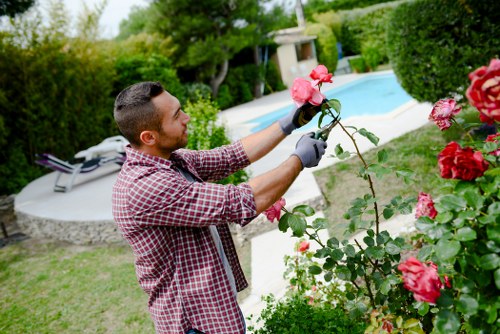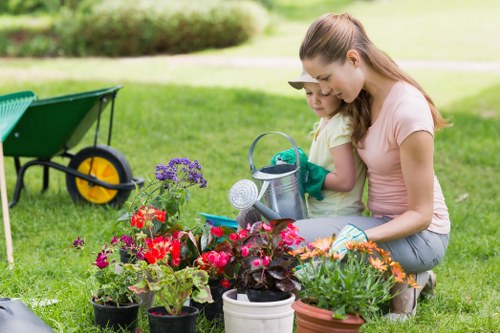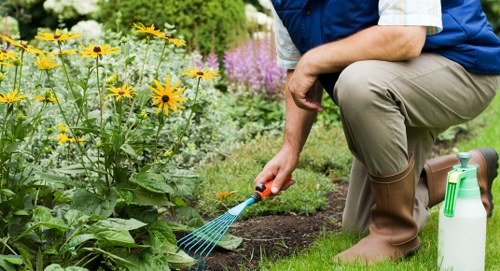Effective Driveway Algae Removal in Stepney: Keep Your Driveway Clean and Safe

Algae growth on driveways is a common issue for homeowners in Stepney. Not only does it make your driveway look unsightly, but it can also pose safety hazards by making surfaces slippery. Understanding how to effectively remove algae and prevent its return is essential for maintaining a clean and safe driveway.
Algae thrive in damp, shaded environments, making many driveways in Stepney the perfect breeding ground. Whether your driveway is paved with concrete, asphalt, or tiles, the presence of algae can diminish its appearance and longevity.
In this article, we will explore the best methods for driveway algae removal in Stepney, including both DIY solutions and professional services. We will also discuss preventive measures to keep your driveway algae-free all year round.
Understanding Driveway Algae: Causes and Risks

Algae are simple plants that require moisture and sunlight to grow. However, certain conditions can accelerate their growth on driveways:
- Moisture: Persistent dampness from rain, watering plants, or poor drainage.
- Shade: Areas that receive limited sunlight provide an ideal environment for algae.
- Organic Material: Debris such as leaves and dirt can serve as nutrients for algae.
The risks associated with driveway algae include:
- Slippery Surfaces: Algae can make driveways dangerously slippery, increasing the risk of falls and accidents.
- Structural Damage: Over time, algae can contribute to the deterioration of driveway materials.
- Decreased Curb Appeal: Algae growth can make your property look neglected.
DIY Methods for Driveway Algae Removal

Removing algae from your driveway doesn't always require professional help. Here are some effective DIY methods you can try:
1. Pressure Washing
Using a pressure washer is one of the most efficient ways to eliminate algae. The high-pressure water jets can remove algae from various surfaces, including concrete, asphalt, and paving stones.
Steps:
- Clear the driveway of any debris.
- Apply a pre-treatment algae remover if available.
- Use the pressure washer starting from the highest point and work your way down.
- Ensure thorough coverage, especially in shaded and damp areas.
- Rinse the driveway thoroughly with clean water.
2. Vinegar Solution
Vinegar is a natural and eco-friendly option for algae removal. Its acidity helps kill algae without harming the driveway surface.
How to Use:
- Mix one part vinegar with four parts water.
- Apply the solution to the affected areas using a spray bottle or garden sprayer.
- Let it sit for 15-20 minutes.
- Scrub the area with a stiff brush.
- Rinse thoroughly with water.
3. Baking Soda Paste
Baking soda is another household item that can effectively combat algae growth.
Application:
- Mix baking soda with water to form a thick paste.
- Spread the paste over the algae-covered areas.
- Allow it to sit for an hour.
- Scrub the driveway with a brush.
- Rinse off the residue with water.
Professional Driveway Algae Removal Services in Stepney

While DIY methods can be effective, sometimes professional help is necessary, especially for severe algae infestations or large driveways. Professional services in Stepney offer specialized equipment and expertise to ensure thorough cleaning and long-lasting results.
Benefits of Hiring Professionals:
- Expertise: Professionals understand the best techniques and products for different driveway materials.
- Time-Saving: Hiring a service can save you time and effort, allowing you to focus on other tasks.
- Safety: Professionals have the necessary safety equipment to handle cleaning agents and machinery.
When choosing a professional service, consider the following:
- Experience and reputation in the Stepney area.
- Customer reviews and testimonials.
- Pricing and service packages.
- Environmental friendliness of the cleaning products used.
Preventive Measures to Keep Algae at Bay

Prevention is always better than cure. Implementing the following measures can help prevent algae from returning to your driveway:
1. Improve Drainage
Ensure that water drains away from your driveway effectively to reduce moisture levels. Consider installing proper drainage systems or regrading the driveway to prevent water pooling.
2. Increase Sunlight Exposure
Trim overhanging branches and remove obstacles that block sunlight. More sunlight means less moisture and reduced algae growth.
3. Regular Cleaning
Maintain a regular cleaning schedule to remove debris and prevent organic material from accumulating on the driveway.
4. Seal Your Driveway
Applying a sealant can protect the surface from moisture and make it harder for algae to take hold.
5. Use Algae-Resistant Materials
When resurfacing or installing a new driveway, consider using materials that are less prone to algae growth.
Local Relevance: Driveway Algae Removal Services Near Stepney
Stepney is surrounded by several areas that also require effective algae removal services. Here are some of the closest areas to Stepney where you can find reliable driveway algae removal services:
- Bow: Just north of Stepney, Bow offers a variety of professional cleaning services tailored to local needs.
- Poplar: East of Stepney, Poplar residents can access specialized algae removal experts who understand the area's specific challenges.
- Bethnal Green: Southwest of Stepney, Bethnal Green boasts experienced professionals with a track record of effective driveway maintenance.
- Canary Wharf: Known for its commercial areas, Canary Wharf also offers top-notch residential algae removal services.
- London Fields: To the west, London Fields provides comprehensive driveway cleaning solutions, including algae removal.
- Dalston: North of Stepney, Dalston residents benefit from local experts who offer efficient and affordable services.
- Silvertown: Adjacent to Stepney, Silvertown has a growing number of services catering to driveway maintenance and algae removal.
- Stratford: A short distance east, Stratford offers advanced cleaning technologies for effective algae removal.
- Leyton: Southeast of Stepney, Leyton residents can find reliable services that ensure long-lasting driveway cleanliness.
- Hackney Wick: Close to Stepney, Hackney Wick provides specialist services with a focus on eco-friendly solutions.
- Liverpool Street: Western neighbor, Liverpool Street hosts a variety of driveway cleaning professionals adept at algae removal.
- Whitechapel: South of Stepney, Whitechapel offers specialized services tailored to different driveway materials.
- Shadwell: Another nearby area, Shadwell has experts who can handle even the most stubborn algae infestations.
- Wapping: East of Stepney, Wapping provides high-quality driveway maintenance services, including algae removal.
- Isle of Dogs: A bit further east, Isle of Dogs offers comprehensive cleaning services to keep driveways algae-free.
Choosing the Right Method for Your Driveway
Selecting the appropriate method for algae removal depends on several factors, including the extent of the algae growth, the type of driveway surface, and your budget. Here's a quick guide to help you decide:
- Minor Algae Growth: DIY methods like vinegar solutions or baking soda paste are usually sufficient.
- Heavy Algae Infestation: Professional pressure washing or chemical treatments may be necessary.
- Preventive Maintenance: Regular cleaning and sealing should be part of your driveway maintenance routine.
- Eco-Friendly Preferences: Opt for natural cleaning agents like vinegar and baking soda or hire professionals who use environmentally safe products.
Cost Considerations for Algae Removal in Stepney
Costs for driveway algae removal can vary based on the chosen method and the size of your driveway. Here's a general overview:
- DIY Methods: Typically cost-effective, ranging from £10 to £50 for materials like vinegar, baking soda, and brushes.
- Professional Services: Prices can range from £100 to £300 depending on the complexity of the job and the area covered.
- Preventive Measures: Sealing your driveway may cost between £150 and £400, depending on the driveway size and the type of sealant used.
Environmental Considerations
When removing algae, it's important to consider the environmental impact of the methods and products you use:
- Eco-Friendly Cleaners: Vinegar and baking soda are safe for the environment compared to harsh chemical cleaners.
- Proper Disposal: Ensure that any runoff from cleaning processes does not contaminate local waterways.
- Professional Practices: Hire services that prioritize environmentally responsible methods and products.
Maintaining Long-Term Driveway Health
Maintaining a healthy driveway involves regular upkeep and proactive measures. Here are some tips to ensure your driveway remains algae-free:
Regular Inspections
Check your driveway periodically for signs of algae growth, especially after heavy rains or during damp seasons.
Prompt Cleaning
Address algae spots as soon as you notice them to prevent widespread growth.
Proper Sealing
Seal your driveway every few years to protect it from moisture and algae.
Vegetation Management
Keep surrounding vegetation trimmed to increase sunlight exposure and reduce shade.
Effective Drainage
Ensure that gutters and drains are functioning correctly to prevent water accumulation on your driveway.
Conclusion
Driveway algae removal in Stepney is a manageable task whether you choose to tackle it yourself or hire professionals. By understanding the causes of algae growth and implementing effective removal and preventive strategies, you can maintain a clean, safe, and attractive driveway.
Frequently Asked Questions
1. How often should I clean my driveway to prevent algae growth?
Regular cleaning, at least twice a year, can help prevent algae growth. Additionally, address any moisture issues promptly to reduce the likelihood of algae proliferation.
2. Can algae damage my driveway permanently?
While algae itself doesn’t cause structural damage, the moisture associated with its growth can contribute to the deterioration of driveway materials over time.
3. Are there eco-friendly products available for algae removal?
Yes, products like vinegar and baking soda are eco-friendly options. Additionally, many professional services offer environmentally safe cleaning solutions.
4. Is pressure washing safe for all types of driveways?
Pressure washing is generally safe for concrete, asphalt, and paving stones, but it's important to use the appropriate pressure setting to avoid damaging the surface. When in doubt, consult a professional.
5. How long does it take for algae to grow back after removal?
The regrowth rate of algae depends on environmental conditions such as moisture, shade, and temperature. Implementing preventive measures can significantly slow down the regrowth process.


